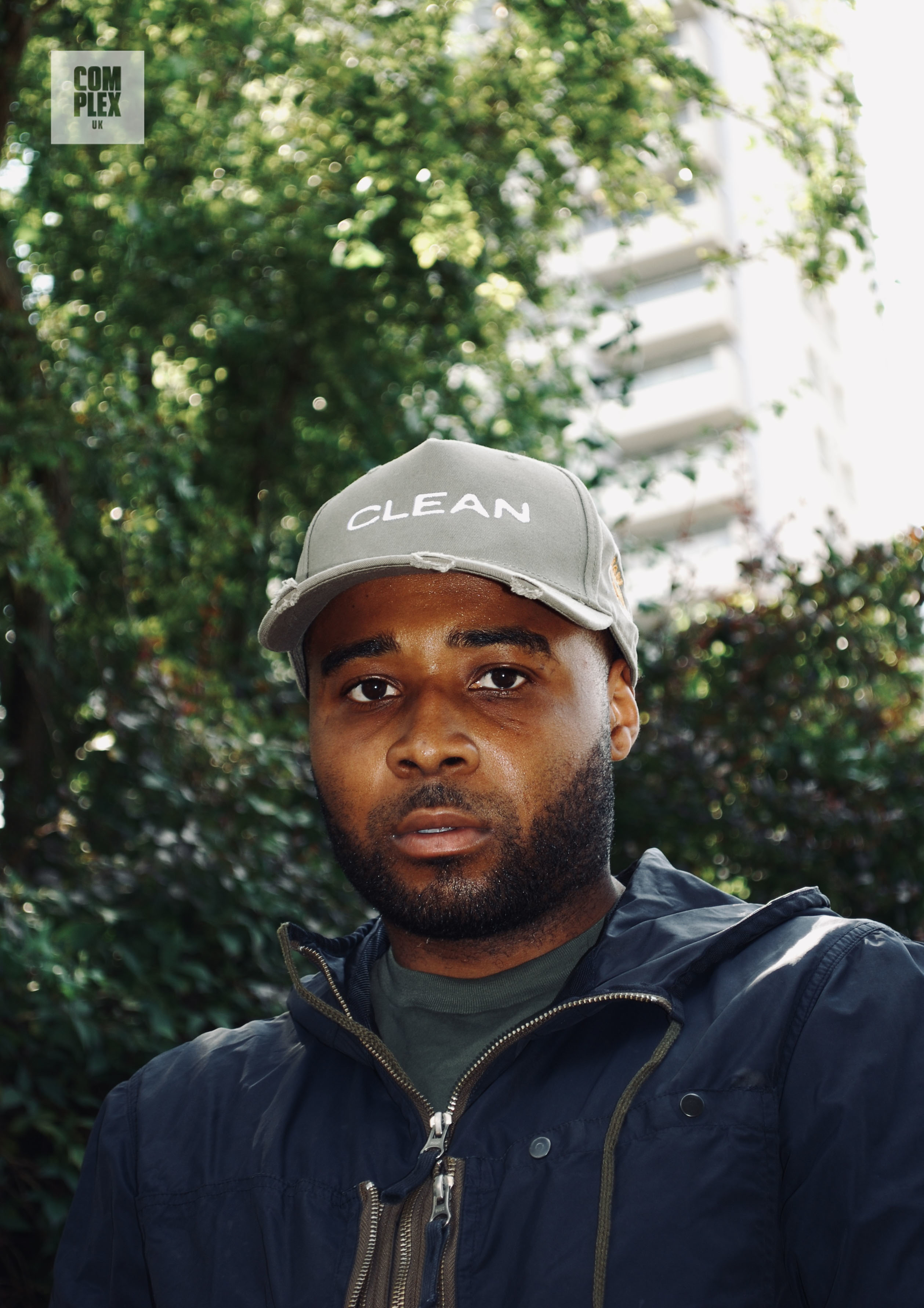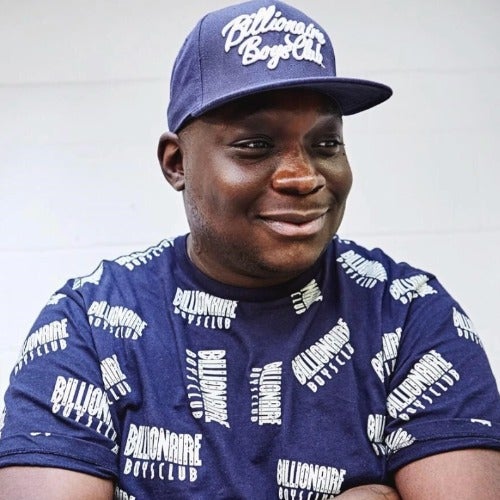
It’s a Tuesday afternoon, and I’ve just wrapped up a meeting when I get a text from So Large with the alert: “Yo, bro! I’m outside.”
The East London native had driven down South for an interview we had been planning to have for a while—pretty much since I placed him on this list last year—but our schedules just didn’t align; more so from his side, though, because if he’s not flying out to Jamaica to visit family, then he’s living it up in Ibiza with the guys. Such is the life of a fly-boy MC.
So Large is a name that has been ringing loudly in the grime scene for the past few years, but he’s actually been around since 2005, just as grime was heating up underground and becoming a staple in Black British music. Having grown up with the seminal Ruff Sqwad, So Large was essentially an unofficial member, regularly shelling down sets and shows with them and lighting up the scene with his angst-ridden flows and ragga-inspired stylings. But he wasn’t as confident back then to be the artist he is today. “I used to get upset because I saw how much work people like Ruff Sqwad were putting in and weren’t really getting their just dues,” he explains. “To me, what they put out into the world is still some of the best music I’ve ever heard, but I just used to think to myself, ‘I’m not really seeing them reap the rewards, the fruits of their labour, so what’s the point in me trying a thing?’ Which was a silly way to think because I lost a lot of years from sitting on the sidelines.”
Some might attribute So Large’s recent success to the hype he’s caused on Twitter Spaces, a platform he’s been known to jump on and get into heated debates with other MCs and self-crowned “critics” about grime’s current state. Others might say it’s the show-stealing verses he’s had on tracks, or the reload-worthy freestyles he’s always putting out. Whichever way you look at it, it’s all worked in his favour as he is one of the few artists keeping the genre relevant and on its toes right now.
We caught up with So Large to talk about his ascension and what he has in store for us next.
“Popular culture in the UK stems from grime, so that’s always gonna be there. But musically, we all need to make sure we’re connecting more dots with the people out there.”
View this video on YouTube
COMPLEX: You’ve got a lot of buzz around your name at the moment and, honestly, you’re making grime relevant for a lot of us in the 30-and-over gang. You’ve been around for a long time and you haven’t even released a project—but you’re still here. How have you been able to do it?
So Large: [Laughs] You know what? I’ve built and scrapped about three different mixtapes, but I just stay knocking out the singles and the freestyles to keep up the work-rate and to keep present. I don’t wanna drop the mixtape on deaf ears, J. I feel like when I drop that body of work, it has to really shift. Soon come, though. I’ve just been in people’s faces with the tracks and freestyles, not taking my finger off the pulse. But at the same time, I don’t really feel like it’s at that point where they’re demanding a project from me. My core listeners are people around my age, which I’m not angry at. It would be nicer to have a broader amount of listeners, but me, personally, I listen to rappers and MCs who are roughly around my age, if not a bit older. I can’t listen to yutes who are, like, 21 years old... Not even on some granddad or hating thing, but I can’t really process what they’re saying and relate to it.
This brings me on to your whole ‘Clean Section’ movement. From what I can gauge, you’re saying that grime needs to be cleaned up a bit in terms of how artists act online and even present themselves in real life. Tell us more about that.
It’s not exclusive to just grime music or music in general—it’s more of a message to us as a people and culture. I feel like we celebrate and worship the wrong things. I feel like an old man talking like this [laughs], but I remember growing up looking up to the successful and productive people in the community; now, I feel like the wrong message and examples are being set and that needs to stop immediately. But Clean Section is also a clothing brand, management, producers… I want to sign some artists as well. I wanna do everything under the Clean Section banner.
The ‘Clean Section’ term was used a lot on Twitter Spaces when it was popping last year. You had a lot of back and forths with people on there about the state of the grime scene and some people were offended, but I think most people listening into those conversations were in agreement with you. Some MCs have made the scene look “popped down”, as they say, and someone needed to be vocal about the reality of that.
I spoke to a man today and we were reasoning, saying that Spaces was a good thing at first. It was positive—influential people with a lot to say were coming on there and dropping gems. It was making sense. I feel like the bar got lowered when they just started letting anyone on there, talking a madness. It felt like a community thing at first, like a hub, which reminded me of the older grime days because it was also a community-based thing—what with pirate radio and things like that. But then it turned into a shit-show. People started drawing people out, and I got drawn out as well, but I’m only human. My skin is only so thick and there’s only so much I can hear before I bug out [laughs]. I’m not used to someone being online trolling me and I just sit there with my hands by my side. But I know how it looks. Think about your top three UK rappers—you are not seeing them on Spaces arguing with idiots. So if you want to really tap into that, you can’t be on there going back and forth with bottom-feeding people, because that’s what it’s become: full of bottom-feeding people. But it wasn’t like that at the start.
Why did you choose grime as a sound and scene that you wanted to be part of?
It’s just where we come from, really. It was all around us growing up, in Bow, Tower Hamlets, East London. It’s a musical ends; everyone’s involved somehow, somewhere. You’re either producing, DJing, MCing or just spectating. I went to school in Newham, and loads of mic-man went to that school. So, naturally, you just get involved with what’s going on.
“A lot of people tell me I’ve got a laid-back, easy-guy character in real life, so they’re shocked when I pick up the mic and start showering down… I black-out when I’m on the mic, and I don’t care who’s in the room.”

Back in the day, I always saw you around Ruff Sqwad. How did you guys first connect?
They’re all from my area. I went to school with Tinchy [Stryder]; he was in my class. We all kinda grew up together... I was around a lot of greatness during those times. It was inspiring. But I’m not gonna lie to you: for a long time, I decided to sit it out because I felt like my levels weren’t on a lot of other people’s levels, you get me? And I used to get upset because I saw how much work people like Ruff Sqwad were putting in and weren’t really getting their just dues. To me, what they put out into the world is still some of the best music I’ve ever heard; people love nostalgia so they’re seeing a lot more love now than what they did when they were collectively active. But yeah, I was disheartened by just seeing that early on. I used to think to myself, “I’m not really seeing them reap the rewards, the fruits of their labour, so what’s the point in me trying a thing?” Which was a silly way to think because I lost a lot of years sitting on the sidelines.
How would you compare grime in 2005 to grime in 2023?
Grime in 2005, it was just a lifestyle. It was everywhere. Cars would be blasting pirate radio sets on a regular, and then for the MCs, hearing that all day, you’d want to go and record a new set as well. That’s just how it was. Stamina was a man that knew everyone, so he’d make a phone call to a DJ or one of the people that runs a station, and be like, “Yo! Can man pull up?” It could be Freeze FM one day, Rinse FM the next, Axe FM the following day or even Deja or Raw Mission. It was part of the lifestyle, man. We were living it, off the whim, go to a radio station and start bussin’ mic.
View this video on YouTube
I always talk about how those practice hours were beneficial for a lot of grime MCs, and what has set them apart from a lot of the rappers/drillers today. You guys had time to work on your craft in that pirate radio, community-minded setting.
It’s true. I feel like most good grime MCs can switch it on automatically; throw them a mic, any time, anywhere, and they can just switch on and perform. A lot of people tell me I’ve got a laid-back, easy-guy character in real life, so they’re shocked when I pick up the mic and start showering down [laughs]. But it’s just natural to me; it’s just in me to do that. I black-out when I’m on the mic, and I don’t care who’s in the room.
But where does that energy come from? You’ve got a yardman twang to your flow as well—talk about that.
I’m from East, but I used to take in North London MCs quite a lot. Heat FM times, listening to Meridian Crew: Bossman, Prez T, Skepta, Big H… This might have even been before Skepta got stuck in. Then you had TMT crew: Frisco and them man there. In my ends, people used to say we sounded like white boys [laughs], whatever that means, but I feel like them Tottenham man, them North London man, they’re not trying to be yardies but you can hear they probably are from a Jamaican background. It’s hard to explain, but it’s just their lingo in their area and I like that lingo because I feel like I’m from that.
“You’ve got to move with the times, but that doesn’t mean you’re trying to look like the kids or sound like the kids, but there has to be an evolution.”

Lyrically, you remind me more of a rapper, in the sense you talk a lot about being a boss and living the fly-boy lifestyle. Grime hasn’t really seen that—or has it?
Definitely, J: Kano, Frisco and Wiley talking about Prada, Esco talking about tinted X5 Jeeps, Bossman talking about shottin’ work and his mum can’t stand him [laughs]. That’s the shit I loved, that boasy grime music. We were from the streets so we connected with it on a lot of levels, from the struggle to the flossy stage. People love the whole nostalgia thing but are quick to forget that this kinda talk was there from the start. That’s why there’s a lack of youth: because there’s a disconnect with how people are living these days. There’s nothing wrong with inspiring people with that boss talk, however you get it. You’ve got to move with the times, but that doesn’t mean you’re trying to look like the kids or sound like the kids, but there has to be an evolution.
There’s nothing wrong with nostalgia, respecting roots and clapping for what came before, but a lot of entitlement comes with that. All the top boys in this thing, the Skeptas, the Ghetts’, the Kanos, they’re not sitting around waiting for their flowers. Them man will pop out today with a new banger and they’ll be getting ratings for that banger. They’re not sitting back thinking, “You should respect me because I made a banger back in the day.” A lot of people want to live off of their old flowers, but you’re talking to a set of people that might have been in primary school when this or that happened.
How can grime get to the next level?
I feel like we need to attract the youth. A lot of the antics by people who are trying to push themselves to the forefront are scaring away the youth, and not even just the youth—the people who are popular or the people that you would want representing the music genre, you know what I’m saying? When I see MCs like Duppy and Kruz Leone, I’m relieved. It’s like, “Yes! There’s some ‘normal’ guys representing the scene and pushing our thing forward.” It’s good to have people like Solsa come in and stir the pot as well [laughs]. Although he might have some hooligan behaviour traits, he does make great music. At the end of the day, popular culture in the UK stems from grime, so that’s always gonna be there. But musically, we all need to make sure we’re connecting more dots with the people out there.



